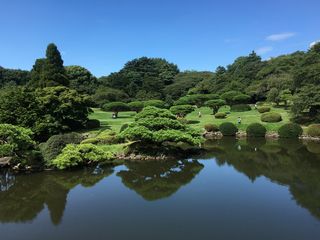
Introversion
Introvert Isle
How Japan made me feel more at home than home.
Posted September 24, 2016 Reviewed by Ekua Hagan

It now seems curious to me that, as a child living in rural Minnesota, where we received one TV station, I could have become so obsessed with an island country on the other side of the globe. I pored over photos of ikebana flower arrangements, bonsai trees, and tea gardens. I loved the kimono, calligraphy, and intricate images on room-dividing screens. In a world that often left me feeling behind, and in a family of 10 that often left me exhausted, Japan offered an alternative that seemed more ordered and thoughtful. At age 10, I vowed to my reflection in the mirror that I would travel to Japan before I died.
I just returned from that trip.
My book, Introvert Power, had traveled there before me. The Japanese edition greeted me in bookstores in Tokyo and Kyoto. In the book, I discussed the challenge of being an introvert in a society that often operates on the "Extravert* Assumption"—the assumption that (a) people are extraverted and (b) any deviation from the extraverted standard is a source of concern. This assumption not only inspires people to ask quiet individuals "What's wrong?" but inspires introverts to ask the same question of themselves: "What's wrong with me?"
This may explain why, though I didn't speak the language or share the appearance of my Japanese hosts, I felt, in so many ways, at home. Let me count the ways:
1. Quiet is considered a right. On trains and subways, you are asked to silence your phone and refrain from speaking on it. As we entered Shinjuku Gyoen, one of Tokyo's largest and most beautiful parks, the list of rules assured me that visitors wouldn't be cranking music and cracking open beer cans. Parks—and there are acres of them—are there to provide serenity. As I viewed the spectacular skyline of Tokyo, I was struck by the lack of noise. What was different? Nobody was honking their horns.

2. Safety is assumed. Tokyo, the largest city in the world, is also one of the safest. In addition to the absence of horn honking, I rarely heard a siren. An online ex-pat guide notes that "finder's keepers" is not an assumption shared in Japan: "Tokyo citizens hand in billions of yen in lost cash each year, often waiving their right to receive the money if nobody makes a claim. Around 3/4 of the money is returned intact to the rightful owners, as are wallets, phones, and other personal belongings." Rather than being on the watch for pickpockets and intruders, I enjoyed the freedom of leaving my bag at the table while ordering a drink.
3. Privacy is valued. Toilets offer a "music" option, which is a continuous flushing sound that disguises any sounds you may not want shared. Bookstore cashiers provide a paper cover for your book, as it's nobody else's business what you are reading. A greeting will not include a hand thrust out for a shake, but a respectful bow. Even extraverted pursuits have boundaries: You get a karaoke room, so your vocal experiments are only shared with your immediate party.
4. Nature is revered. Gardens in Japan are works of art, and even when they are inundated with tourists, they communicate a feeling of stillness and calm. Reflected beauty in the water seems to encourage the act of reflecting. Tokyo houses expanses of nature, including a 100-year forest, that allow you to step out of the city while being in the city. Temples and shrines are placed within gardens and forests, on mountainsides, emphasizing the part nature plays in the spiritual.
All these features delighted the 10-year-old me who had longed for this place. And yet, the quality that moved me most was the way the people treated us. In a way, they assume introversion—not getting in your way, but picking up on cues when you need something or are ready to engage. I was struck by this when my husband and I stepped into a tiny sake bar in Osaka (bars and restaurants are generally tiny in Japan). There was a neighborly feel to the place, but people let us alone until we raised our glasses for a toast, then they were our best friends. This ability to provide space while being available is a sensitive balance that often flummoxes people in America. And the key may be sensitivity: A collectivist culture fosters this. You look out for everyone in your sphere, not just yourself.

I now understand why the 10-year-old me needed Japan. Japan promised to show me that my preferences weren't weird at all. Just perhaps a bit foreign.
*Popularly spelled, "extrovert," this blog post uses the spelling, "extravert," which is the convention in academic settings.

